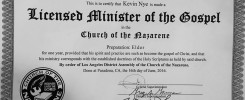When I was younger, I remember my grandma telling me about the worst sermon she ever heard. It was on this passage, and the preacher had told the congregation that the miracle of this story is not Jesus multiplying the bread and fish, but that everyone actually had bread and fish but didn’t want to share it. So when the disciples set out the little that they had, everyone who was there chose to share what they had with one another, and the multiplication simply happened because there was already enough food, and they decided to share it in common. My grandma was really upset by this interpretation, because she said it diminished the miracle. In that version, Jesus wasn’t necessary, there was no real act of God, just a humanist sharing. I always remembered that because I was on my grandma’s side; how dare that pastor try to tell my grandma that Jesus didn’t have the power to make more food!
Fast forward a few years, and now I’m in Bible school and seminary and I’m beginning to read the Bible in new ways. I start to learn that it’s okay to not read every passage literally – in fact, it’s impossible to do that. Some books and passages have to be read the way they were meant to be read, not the way I want to read them, by picking up the Bible at a random page and projecting everything I want and believe onto what I’m reading. I think
back to this story and passage and begin to wonder, maybe that pastor was right. The passage never says that the bread and fish multiplied, that the fish started separating into two fish and then four and then 16 until there was enough. Like any student who’s first learning something that challenges their earlier beliefs, I fell fully into it. It’s amazing that the historical Jesus inspired a crowd to share what they have. Is it a miracle? Who could explain that?
Years later, I find myself laughing at both extremes. My grandma was right; this was a miracle. The text wants us to know that. 5,000 men, only 5 loaves and 2 fish, and 12 baskets leftover? Everyone was fed? This is a miracle. Did the loaves separate? Did the crowd add some of their own food to the communal pile? I don’t know. Even if they did, is that less of a miracle? Do we not believe that every good gift comes from God? Maybe God multiplied
their bread the day before, for them all to bring with them? Maybe God slowly and methodically blessed those in the crowd to have more than enough to bring to the gathering that day. Maybe it was both. Maybe it was neither. But everybody had enough, because of the blessing of Christ. When God blesses, there is enough.
A beautiful poem by Mary Oliver really helped me unlock this passage. Sometimes where Bible scholars and historians and scientists fail, poets help us read scripture; so much of it, after all, was written by poets. Mary Oliver writes a poem called Logos, and it says this:
Why worry about the loaves and fishes?
If you say the right words, the wine expands.
If you say them with love
and the felt ferocity of that love
and the felt necessity of that love,
the fish explode into many.
Imagine him, speaking,
and don’t worry about what is reality,
or what is plain, or what is mysterious.
If you were there, it was all those things.
If you can imagine it, it is all those things.
Eat, drink, be happy.
Accept the miracle.
Accept, too, each spoken word
spoken with love.
Accept the miracle = it was all things, plain, mysterious. I understand why she calls the poem “logos,” because this intermingling of reality and mystery is most understood in the person of Jesus. Jesus is the word of God made flesh, fully God and fully human. Try formulating a thesis on that one. And so it is no surprise that this divine and yet fully historical, real and mystical Christ would deliver a miracle that feeds a crowd literally, and
feeds us today spirituality. When God blesses, there is enough. There is more than enough.
There are leftovers. I’m reminded of when Jesus turns water into wine. There’s an extra detail that the wine Jesus made was better than the wine they had already, even though they didn’t need that. When God blesses, there is more than enough.
We can’t separate this miracle from the miracle in the Exodus desert. When the Israelites were stranded in the wilderness, God gave them enough to eat. They were not allowed to take more than they needed, or it would spoil and make them sick. God was blessing, and there was enough; and God was also teaching that to take more than you need is to make a community sick. To take more than you need, even when there is more than enough, is to
violate the generosity of God. Again, we get this great detail in Exodus that the manna tasted like wafers made with honey. They didn’t need to be sweet in order to sustain their bodies, but you see the extra blessing of God in the sweetness of provision. When God blesses, there is more than enough – not just enough to sustain, but enough to bring joy. When God blesses, there is abundance.
And yet, we live in a world where many go hungry. Many do not have what they need. There are some who do not have enough bread to eat. There are many who I see every day who don’t make enough money to live, or to have shelter. We are told there is a shortage of affordable housing. We live in a world, even in a country, where there does not seem to be enough to go around. Is this passage wrong? Is God wrong? When God blesses, there is more than enough to go around, right? So why does it seem there is not enough to go around?
Where is the missing abundance? I think we all know the answer to that. There is, of course, enough. But like a game of telephone, it doesn’t seem to make it all the way around. 1/3 of the food we purchase in America is thrown out. The wealth gap between the rich and the poor is the worst it’s ever been in America, and is among the worst in the whole world. Units and rooms in houses and hotels and apartment buildings sit empty every night, while 50,000 people live on the streets or in their cars.
It is true that God has richly blessed America. Any time there is enough, any time there is an abundance, it is a miracle, just like my grandma said. But if there is more than enough, and yet all do not eat, or all are not filled, then we have not done what God has blessed us for. We have taken more than our daily bread. We have taken someone else’s bread. If there is more than enough, and not everyone is filled, we have cut others off from God’s blessing and hoarded it for ourselves.
When God blesses, there is more than enough. For some of us today, we are in search of enough, and the Gospel offers us comfort. It offers a mystery and a miracle, that the bread and fish will multiply. For those of us who have had our daily bread, or maybe a little more, the text beckons us with a challenge. Will we add what we have to the gathering? Will we accept that if God has multiplied our blessings, it is so there will be more than enough for everyone? As we move to the table and accept the bread and the cup, notice that for whoever you are, and however much you have, and however much good or wrong you have done, the same amount of Christ is offered to you, and it is more than enough.


Comments are closed.